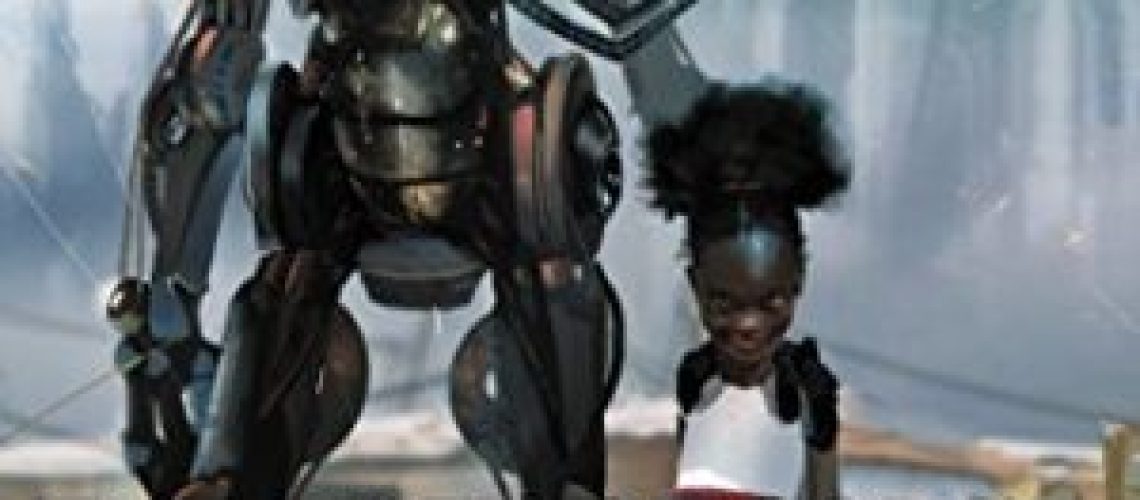Artificial Intelligences, Gods and Goddesses, tailored viruses gone wrong, mind-expanding drugs, political and social turmoil and more, all in a near-future South Africa, is the matrix where Nicky Drayden embeds an assortment of disparate and diverse characters in her debut novel Prey of Gods. The author’s penchant for mixing a variety of characters and a variety of genre elements that do not seem to match together or work together at first makes the novel one of the most intriguing and unpredictably diverse novels I have read in 2017.
There are a number of threads and plots and stories going on through the novel in what at first appears to be a discordant tangle, but in truth is a layered and complex story that eventually comes together. The author slowly allows the silos of stories and characters and their individual genre elements to come together and mix, and recombine in the latter portions of the novel. It’s probably easiest to describe the individual silos and what’s going on, one by one, as a sense of what Drayden is trying to do in the novel.

Elkin and Muzi, for example, are longtime friends with a strong relationship, complicated by the fact that their feelings for each other, terrifying to themselves and each other, may go beyond the platonic. The tension of that is overlaid by their use of a strange mind-expanding drug called Godsend whose name proves to be rather prophetic as the novel continues. This thread of the novel is also connected to a focus on Alphas, which are robot servitors in her future society who provide information and run errands. Muzi’s Alpha in particular becomes a character in their own right, and even gets some cryptic, short chapters from their point of view. This strand of the novel revolves around the emergence of superpowers on the one hand, and an artificial singularity on the other.
Sydney, on the other hand, is a goddess working in a nail salon. Casually introduced as such, Sydney has lived for a long time and has been head-down for much of that period. The emergence of a potential rival who doesn’t even know of her power and ability, a young girl named Nomvula, stirs Sydney to action, and in a real way drives the threads of the entire novel together as Sydney sees an opportunity for regaining past glory and power. Their story is a story of deities old and new, apotheosis and conflict between gods.
Councilman Wallace Stoker is a hard-working civil servant, but he secretly wishes that he could take the stage, and do that as the person he truly feels he is, as a woman. He has to deal with a terrifying explosion of the deerlike dik-dik population and try to help manage the economy of the local area while looking at his political future — and yet his mind is on an audition to be an opening act for pop star Riya Natrajan. She herself is trying to keep her act together under the strain and stresses of near-future South Africa, and is ultimately the hub that all of the other characters in the novel revolve around. And Riya has secrets of her very own, too. This is the strand of the novel that ties into bioengineering, viruses and more. And it is Riya’s own concert where all of the characters and strands come together in a glorious blending of elements, characters, ideas, and conflict.
And yet for all of those disparate strands, the novel’s threads and characters comment on common themes and ideas that help hold the novel together until that final conflict. For all of its both unfamiliar and very familiar future, the novel is very much, for me, meditations and explorations on the idea of identity. The identity of a person, in a relationship, or not, with their best friend. The identity of a man who feels more comfortable, more natural, more right, in a female persona. The identity of a young girl, unaware that she is, in fact, divine. The identity of an “alpha” who reaches the singularity and intelligence of their own. The identity of a pop star, holding it all together in a facade very different from the person she shows the world. And as the novel continues, these identities are forged, challenged, changed and eventually come to new forms. In a story replete with a dizzying set of SF ideas, the novel in the end strongly relies on its character development as its engines.
There is very little in my reading that comes near the novel, as I have not read much of African SF. Lagoon (Nnedi Okorafor), certainly, with its Aliens and Gods, and Rosewater (Tade Thompson), with its aliens and unusual abilities, come close. Too, the alternate South Africa of Zoo City (Lauren Beukes) is in the same region of SFnal space. But for the most part, one of the most interesting aspects of Prey of Gods, and why I found it such a strong debut, was its lack of familiar moorings, that allowed me to step into its SFF space, and find wonders there. Well done.







